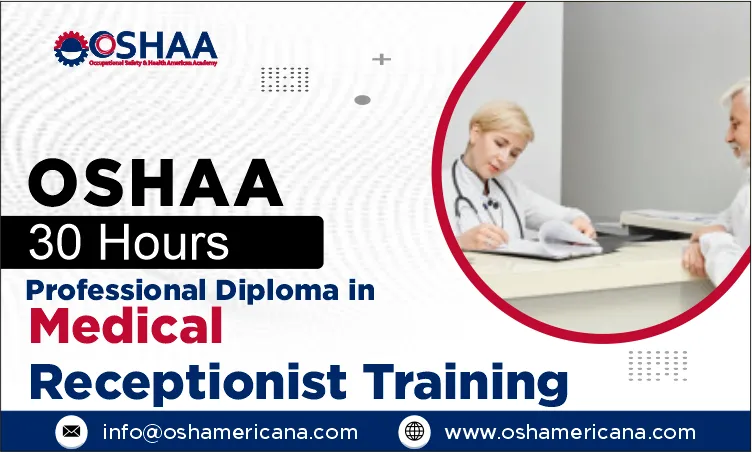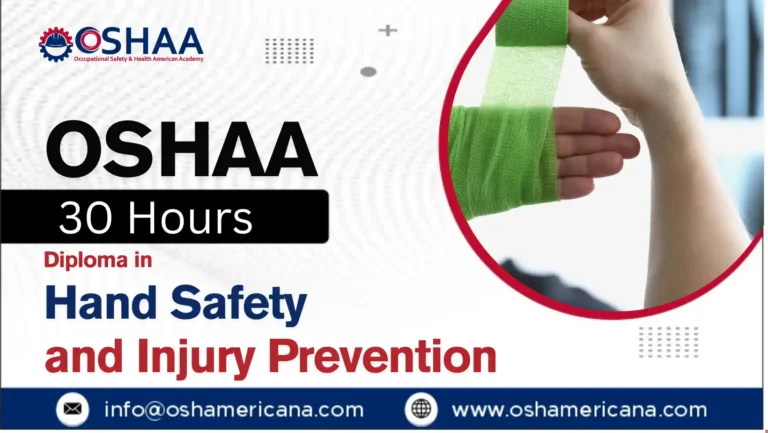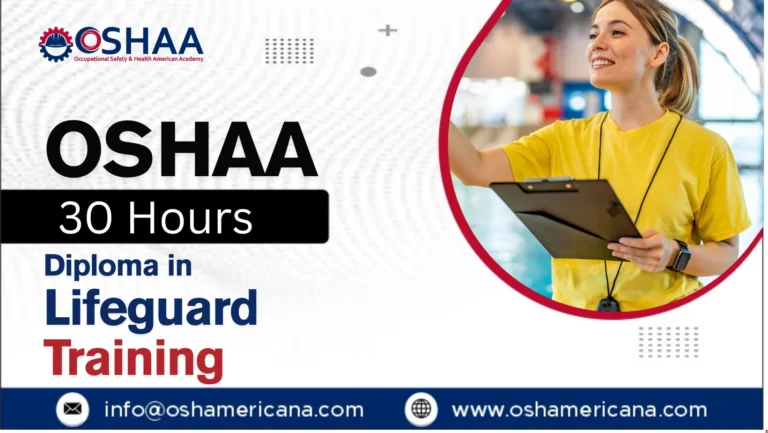Career-Focused Diploma – Become a Skilled Healthcare Frontline Professional
A medical receptionist plays a crucial role in the smooth operation of healthcare facilities, acting as the first point of contact for patients and ensuring efficient administrative processes. The OSHAA 30-Hours Professional Diploma in Medical Receptionist Training is designed to equip individuals with the essential skills and knowledge required to excel in this vital role. This comprehensive course provides a strong foundation in medical administration, patient communication, and healthcare regulations, preparing participants for a rewarding career in the healthcare sector.
Medical receptionists are responsible for managing front-desk operations in hospitals, clinics, and other healthcare settings. Their duties include scheduling appointments, handling patient records, processing insurance claims, and ensuring a welcoming environment for patients. Given the fast-paced nature of healthcare, medical receptionists must be organised, professional, and able to handle sensitive information with discretion.
The OSHAA 30-Hours Professional Diploma in Medical Receptionist Training provides an in-depth understanding of the responsibilities of a medical receptionist and the skills required to perform the role effectively.
The OSHAA 30-Hours Professional Diploma in Medical Receptionist Training is an excellent opportunity for individuals looking to start or advance their careers in healthcare administration. With a strong focus on professionalism, patient care, and organizational efficiency, this course provides the essential training needed to thrive in the medical receptionist role.
OSHAA 30-Hours Professional Diploma in Medical Receptionist Training
Study Units
Learning Outcomes
Overview of Medical Receptionist Responsibilities (2 Hours)
- Understand the key roles and responsibilities of a medical receptionist
- Recognise the importance of professionalism, confidentiality, and ethical conduct
- Develop an understanding of various healthcare settings and their administrative requirements
- Identify essential skills required for effective medical reception management
Effective Patient Communication and Customer Service (4 Hours)
- Develop strong verbal and non-verbal communication skills for patient interactions
- Handle patient inquiries, concerns, and complaints professionally and empathetically
- Apply active listening techniques to improve patient satisfaction and engagement
- Manage stressful situations with professionalism and maintain a positive front-office environment
Managing Appointments and Scheduling Systems (5 Hours)
- Learn how to efficiently schedule and manage patient appointments
- Understand different types of scheduling systems used in healthcare settings
- Minimise scheduling conflicts and reduce patient wait times through effective time management
- Handle cancellations, rescheduling, and emergency appointments appropriately
- Utilise digital and manual appointment management tools effectively
Patient Registration and Data Entry Procedures (3 Hours)
- Understand the process of patient registration and intake procedures
- Accurately collect and record patient information while maintaining confidentiality
- Improve efficiency in data entry using electronic and manual systems
- Identify common errors in patient data management and how to prevent them
Medical Record-Keeping and Electronic Health Records (EHR) (4 Hours)
- Understand the importance of accurate medical record-keeping in healthcare settings
- Learn how to use electronic health records (EHR) systems effectively
- Maintain compliance with data protection and confidentiality regulations
- Recognise best practices for updating, storing, and retrieving patient records securely
Basics of Medical Billing and Insurance Processing (4 Hours)
- Gain an understanding of medical billing processes and common terminologies
- Learn the basics of insurance claims, coding, and reimbursement procedures
- Handle patient billing inquiries and process payments professionally
- Identify common billing errors and strategies to prevent them
Data Protection, Confidentiality, and Patient Rights (5 Hours)
- Understand the legal and ethical responsibilities regarding patient confidentiality
- Learn about data protection laws, including GDPR and HIPAA compliance
- Recognise patients’ rights and responsibilities within a healthcare setting
- Implement best practices for securely handling and storing sensitive patient information
- Develop strategies to maintain compliance with healthcare privacy regulations
Workplace Health and Safety Regulations in Healthcare (3 Hours)
- Identify key health and safety regulations applicable to healthcare environments
- Understand the importance of infection control and hygiene practices
- Learn how to handle emergency situations and workplace hazards
- Develop awareness of risk assessment and safety procedures to protect staff and patients
- Comprehensive Skill Development
Gain essential administrative, communication, and organisational skills required to work effectively as a medical receptionist in healthcare settings. - Enhanced Career Opportunities
Improve employability with a recognised qualification that prepares you for roles in hospitals, GP clinics, dental practices, and private medical centres. - Improved Patient Interaction and Customer Service
Develop strong communication and interpersonal skills to handle patient inquiries, manage appointments, and provide a welcoming healthcare environment. - Proficiency in Medical Office Administration
Learn how to manage scheduling systems, process patient records, and handle medical documentation with accuracy and professionalism. - Understanding of Medical Billing and Insurance Processes
Gain knowledge of medical billing procedures, insurance claims, and payment processing to support financial transactions in healthcare settings. - Compliance with Legal and Ethical Standards
Understand data protection laws, confidentiality requirements, and patient rights to ensure adherence to healthcare regulations such as GDPR and HIPAA. - Practical Knowledge of Electronic Health Records (EHR)
Develop proficiency in maintaining and updating digital patient records, ensuring accuracy and security in medical documentation. - Workplace Health and Safety Awareness
Learn key health and safety regulations, infection control practices, and emergency response procedures to maintain a safe and efficient work environment. - Personal and Professional Growth
Build confidence in managing front-desk operations, multitasking in a busy environment, and developing a professional approach to healthcare administration. - Pathway to Further Specialisation
Lay the foundation for advanced training and career progression in healthcare administration, medical coding, or practice management.
The OSHAA 30-Hours Professional Diploma in Medical Receptionist Training is designed for individuals looking to start or advance their careers in medical administration. This course is ideal for:
- Aspiring Medical Receptionists – Individuals seeking entry-level roles in healthcare administration who want to develop essential skills for front-desk operations.
- Healthcare Assistants and Support Staff – Professionals working in medical settings who wish to enhance their administrative and communication skills.
- Administrative Professionals Transitioning into Healthcare – Office administrators, secretaries, and customer service representatives looking to specialise in medical reception.
- Current Medical Receptionists Seeking Professional Development – Those already working in healthcare who want to refine their skills, improve efficiency, and stay updated on industry standards.
- Dental and GP Receptionists – Front-desk professionals in dental clinics and general practices who want to strengthen their knowledge of medical office procedures.
- Individuals Returning to Work – Those re-entering the workforce who require formal training to gain confidence and competence in a medical reception role.
- Students or Career Changers – Individuals exploring opportunities in healthcare administration and looking for a recognised qualification to boost their employability.
This diploma provides the knowledge and practical skills necessary to thrive in a medical receptionist role, making it suitable for anyone interested in a rewarding career in healthcare administration.







